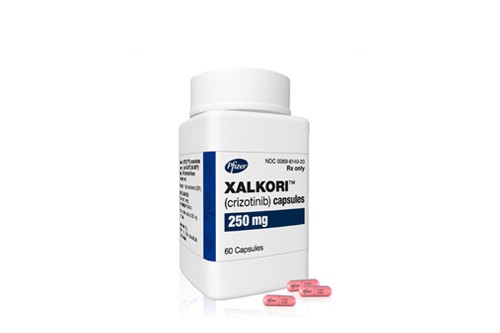
The European Commission has approved a label update for Pfizer’s non-small cell lung cancer (NSCLC) therapy Xalkori, giving it the nod for first-line treatment of ALK-positive patients.
The new indication means that newly-diagnosed, eligible patients can now receive targeted treatment with Xalkori (crizotinib) straight away, rather than having to first undergo chemotherapy.
The ALK inhibitor – which has been approved for second-line therapy of ALK-positive NSCLC since 2012 and is now available in more than 85 countries worldwide – is among Pfizer’s fastest-growing new products with sales rising 23% to $353m in the first nine months of the year.
The data supporting the expanded label comes from the phase III PROFILE 1014 trial, which showed that patients treated with Xalkori had a median progression-free survival (PFS) of 10.9 months compared to 7 months for those in receiving chemotherapy.
The objective response rate for patients on Xalkori was 74%, compared to 45% among the chemotherapy arm.
Around 3% of NSCLC cases result from a rearrangement of the ALK gene, which increases the growth of cancer cells and can be identified by a molecular test of the cancer tumour.
Rob Day, Pfizer’s director of oncology in the UK, said the approval “further highlights the importance of early and routine biomarker testing in patients with advanced NSCLC”.
He called for an “ongoing commitment to investing in diagnostic testing and personalised medicines … if the UK is to lead in the discovery of genomic medicines, and continue to provide world-class cancer care in the NHS”.
Around 57% of NSCLC patients are diagnosed late with advanced disease where the five-year survival rate is just 5%.
Pfizer’s drug – which was recently partnered with Merck KGaA – was the only ALK inhibitor on the market until earlier this year when it was joined by Novartis’ Zykadia (ceritinib), which is approved for use in patients previously treated with Xalkori.
Novartis is carrying out clinical trials of Zykadia as a first-line therapy for treatment-naïve ALK-positive NSCLC patients, which would allow it to compete more directly with Xalkori.
Meanwhile, Pfizer is also developing Xalkori for ROS1-positive NSCLC – which accounts for around 1% of all NSCLC cases – and has been granted breakthrough status for this indication by the FDA.




